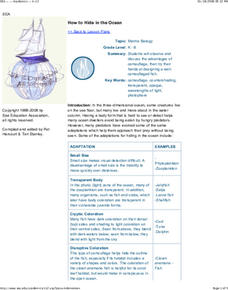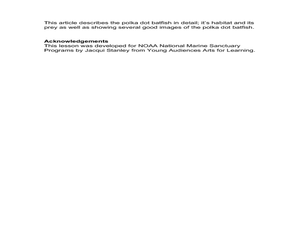Curated OER
Blending Butterflies
Students create camouflage butterflies. In this camouflage lesson plan, students read about the different types of camouflage. Each student in the class chooses a spot in the classroom and creates a camouflaged butterfly. They hang up...
Curated OER
Whose Skin
In this animal skin types worksheet, students complete a chart using names of animals, description of animal's skin, where it can be found and illustrating a picture of the animal's skin.
Curated OER
Birds & Caterpillars
In this biology worksheet, students explain the use of camouflage as a defense mechanism. Then they list examples of insects that use camouflage to protect them from predators. Students also identify and name other types of defense...
Curated OER
Orienteering
Students acquaint with co-participants and identify the practice basic compass functions and orienteering procedures. They also work together to solve a small challenge. Students then identify how the challenge of orienteering relates...
Curated OER
Camouflage and Protective Coloration: A Model of Natural Selection
Students study protective coloration and camouflage in animals. They create examples of each and conduct simulation-type experiments to determine which is the most effective adaptation.
Curated OER
Graphing Predator/Prey Data
Learners use data from the Camouflage Game (played with red and green yarn caterpillars) to create a composite bar graph to display the collected data. They interpret the data and form a conclusion based on the graphs. Teachers may use...
Curated OER
Animal Hide and Seek
Learners examine how animals use their colors to their advantage. They read the book, "Brown Bear, Brown Bear, What Do You See?," participate in a toothpick camouflaging demonstration, explore the Camouflage Field Book website,...
Curated OER
How to Hide in the Ocean
Learners observe the advantages of camouflage. They design a well camouflaged fish of their own.
Curated OER
The Big Hideout
Learners identify the types of camouflage used by animals in the desert. They work together to create their own animal creating their own type of camouflage. They determine how well the camouflage works.
Curated OER
Hide In Plain Sight
Students view video clips and use the Internet to look for hidden animals. They then use the Internet to print out animal shapes and color them. They create environments on construction paper in which their animals can hide.
Curated OER
The Great Jellybean Hunt
Students explore natural selection and its influence on the populations to fine tune traits and characteristics. The acquisition of traits developed out of need is examined through a game played in class.
Curated OER
Camouflage
Third graders collect insects and various bits of the insects' habitats in order to develop an understanding of how camouflage makes the insect fit to survive in its environment.
Curated OER
Explore: 2nd Grade Camouflage
Second graders discuss camouflaging in animals. They create camouflaged animal artwork out of various craft and art supplies and then see how well the creation blends into an outdoor area.
Curated OER
How Organisms Live Successfully in Their Environments
Students compare the climate and organisms found in different environments, then give examples of how plants and animals adapt to their environment. They design an animal who adapts using camouflage to a made-up environment.
Curated OER
Camouflage
Students observe first hand what it is like to be the prey and what he or she must do to blend in and make themselves less noticeable. They participate in a variety of hands-on activities which help them explain how insects hide...
Curated OER
Why are Polar Bears White
Students explore camouflage as they study polar bears and their habitat. They study how color can help animals in the wild.
Curated OER
TIDES
Second graders are taught the concept of camouflage through the game hide and seek. They view photographs of camouflaged animals on the TIDES website. Students create a poster that camouflages a particular animal based on what they have...
Curated OER
Chameleons Are Cool!
Have your learners review what they know about camouflage using this lesson. Learners fill out a graphic organizer listing what they know or have questions about. This could be enhanced with the addition of a writing assignment in which...
Curated OER
Color Crazy
First graders create their own brightly colored animals. In this animal adaptations lesson, 1st graders create an animal that is brightly colored but can blend into it's environment.
Curated OER
Drawing Fish
Students practice creating art by imitating the camouflage of fish. In this animal characteristic lesson, students identify certain fish and their ability to change colors in order to survive in the wild. Students utilize coloring...
Curated OER
Trout Markings
Students paint a trout based on the pictures of trout coloration and markings they see in pictures. In this trout lesson plan, students understand that the markings on a trout are native to their habitats and create camouflage.
Curated OER
Camouflage, Protection, & Adaptations—Who am I?
Students explore ocean animal adaptations. In this animal adaptations lesson plan, students examine how different ocean animals use adaptations other than camouflage to protect themselves.
Curated OER
Animal Camouflage
Students investigate how animals adapt to their environment. In this animal science instructional activity, students participate in an experiment using patterned paper and plain paper to simulate how animals blend into their...
Curated OER
Toothpick Worms
Students investigate camouflage. In this science lesson plan, students experience the role of color in camouflage as they complete a hands-on activity.

























